Hi moms,
This article has been submitted to be my a concerned mother who took the time out of her day to share how much sugar is in health drinks which are marketed for children. I was ecstatic to get this from her and happy to share it with you as well! I encourage mothers to educate themselves before putting anything in their kids’ bodies, especially if it is a pre-made/pre-mixed processed product, because the odds of it being low quality are very high!
Enjoy reading!
Sugar in health drinks for kids, by Hridya Ramani
Sugar seems to be everywhere! It is hiding in our bread, milk, cereal, ketchup, various drinks, baked goods, and many more. One thing that is of particular interest to me is the sugar content in health drinks which are marketed for children. I find it particularly bothersome that children who cannot choose better for themselves consume low quality foods which may harm them in the long run.
I am not a professional, and have no nutritional background, however, I decided to dive deeper and learn more about what the ingredients in these drinks and hopefully help educate other parents along the way. I’ve studied a few health drinks available in India, and other parts of the world. The pictures in the article I got from mommies who are part of a support group I am a member of, in Facebook. One way of making a difference is educating parents about the ingredients in the drinks so that our children are fed the highest quality of foods available for them.
Sugar is the new poison
Sugar (aka carbohydrate) is an essential component in our diets, however, not all sugars are the same. There are two kinds of sugars – simple & complex sugars. Complex sugars take longer to digest and affect the blood sugar levels slower and steadier and as a result have a milder effect on our mood and behavior. On the contrary, simple sugars digest very quickly and tend to spike the blood sugar levels leading to fatigue, irritability, anger, agitation, hunger and the worst of all – craving for more sugar!
The problem is that “health” drinks use simple carbohydrates as their source of sugar which concerns me a lot!
Now, why is sugar added to processed foods, especially “health drinks”?
It is mainly added for flavour. Just think, most kids (probably 90% of the children all around the world) prefer to eat anything sweet. Is this not a common sight at your own home? There is a very small percentage that doesn’t actually prefer to eat sweet stuff. So, it makes perfect sense for companies to make food that is preferred and will sell faster.
Another reason for adding sugar to our food system is that it acts as a preservative, keeping the food last longer on the shelves. So now we have the perfect combination – sweet drink which lasts for months (if not years) – great for business!
Sugar under different names
Manufacturers have learned how to disguise sugar under different names which makes your shopping a lot harder as most of us are not scientists and do not know these terms.
Some of the common names for sugar include: Agave Nectar, blackstrap molasses, cane sugar, confectioner’s sugar, date sugar, buttered syrup, corn syrup solids, lactose, maltodextrin, brown sugar, caramel, corn syrup to name a few. There are many more “synonyms” for refined sugar in the processed food industry. So if you think that sugar as such isn’t mentioned in your drink, stop and read the ingredient list once again!
How much sugar is OK for children?
Here are some facts: Pre-schoolers averaging 1,200 to 1,400 calories per day should limit added sugar to about 4 teaspoons (16 grams) per day. Children ages 4 to 8 who average 1,600 calories per day should limit added sugar to about 3 teaspoons (12 grams) a day.
I’ve researched the ingredient list of nine “health” drinks available in India and United States to see how much sugar is in these drinks, you can find my research below:
1. Junior Horlicks – regular flavour
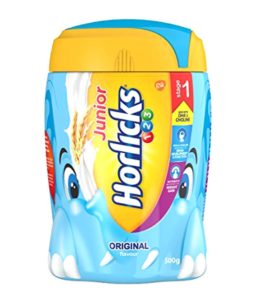
Ingredient list: Wheat flour (33%), Malted Barley (Extracted Solids) (3%), Milk Solids (29%), Sugar, Salt, Acidity Regulator (INS 51 ii), Nature Identical Flavoring substances, DHA rich algal oil, Vitamins and Minerals.
Apart from the usual nutrients that make up the constituents of the drink, let me highlight how much of sugar is present in the form of carbohydrate. 72.7g of carbohydrate, 5g of sucrose or sugar – per 100g of health drink! The ingredients list at the bottom shows sugar and malted barley – both are different forms of sugar itself.
The chocolate flavoured version contains 74.7g of carbohydrate and 30g of sucrose! This is outrageously sweet!
2. Bournvita
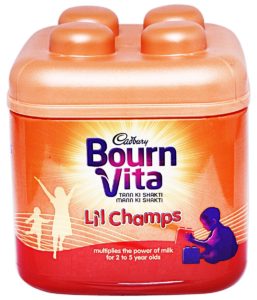
Ingredient list: Malt extract, cocoa solids, sugar, caramel ( E 150 ), milk solids, emulsifiers, liquid glucose, minerals, vitamins, raising agents ( E 500 ), liquid vanilla flavor and salt. It contains some artificial substances and flavor.
This one usually comes in the chocolate flavoured version. If you can see the ingredients at the top – 84g of carbohydrate of which 71g is made up of sugar! How do they rationalize it? To keep baby active! Yes, this is indeed making kids hyperactive these days – sugar! Have you not noticed your children get that energy boost when they have something sweet and they go helter-skelter all around the house and you end up saying, oh this kid is hyperactive, wonder where he gets his energy from. Well, this is where he gets it from, and it is not a great source! So what are the sources of sugar here – sugar, caramel and liquid glucose. Think over this – are these good sources of energy?
3. Pediasure
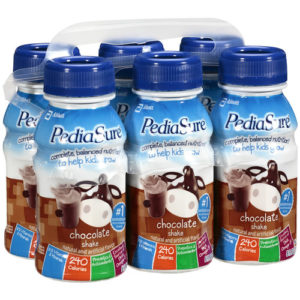
Ingredient list: Water, Sugar, Corn Maltodextrin, Milk Protein Concentrate, High Oleic, Safflower Oil, Canola Oil, Soy Protein Isolate. Less than 0.5% of the Following: Short-Chain, Fructooligosaccharides, Natural & Artificial Flavor, Cellulose Gel, Potassium Chloride, Magnesium, Phosphate, Potassium Citrate, Calcium Phosphate, Tuna Oil, Calcium Carbonate, Potassium, Phosphate, Salt, Cellulose Gum, Choline Chloride, Ascorbic Acid, Soy Lecithin, Monoglycerides, Potassium Hydroxide, m-Inositol, Carrageenan, Taurine, Ferrous Sulfate, dl-Alpha-Tocopheryl, Acetate, L-Carnitine, Zinc Sulfate, Calcium Pantothenate, Niacinamide, Manganese Sulfate, Thiamine Chloride Hydrochloride, Pyridoxine Hydrochloride, Riboflavin, Lutein, Cupric Sulfate, Vitamin A Palmitate, Folic Acid, Chromium Chloride, Biotin, Potassium Iodide, Sodium Selenate, Sodium Molybdate, Phylloquinone, Vitamin D3, and Cyanocobalamin.
This is the drink that spurred me to write this article. The Indian version of Pediasure contains about 50g of carbohydrate and 35g of sugar per 100g of powder. Dorit has written in much detail about this drink here on her page. Basically it is a high calorie drink, that lets your child’s hunger be satiated for quite a long time. It is recommended by doctors for children who are slow to grow and picky eaters, which I find to be outrageous! Doctors should not be recommending sweet drinks to parents who are uneducated and trust them completely.
4. Nu Protein
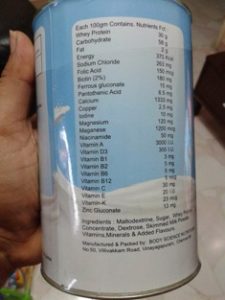
This is a protein shake like Proteinex for kids and apart from the protein present in it, the other ingredients catch my eye. 58g of carbohydrate per 100g – sugar present in the form of maltodextrin, sugar and dextrose. Maltodextrin is basically used as a thickener in drinks, desserts, instant puddings – it is natural but highly-processed. Frequent consumption of this additive can have an impact on your gut’s good bacteria and of course have an effect on your blood sugar.
5. Similac Advance 2 – Baby Formula
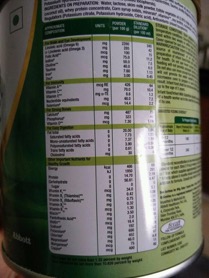
Formula does contain a good amount of sugar, it is sweet and that is why most infants take to this type of formula milk way too easily and it sometimes becomes a problem to get them to wean from it. In this picture, the column for sugar says 0 but the ingredients mentions Corn syrup solids! Corn syrup is composed of 100% glucose. Corn syrup solids are made by dehydrating corn syrup till it has about 10% water. This is used in creamers and drink mixes. Although, corn syrup solids are marked safe for infants to consume, it is worrying if there is any GMO based ingredient in the drink.
6. KidiCare Pro
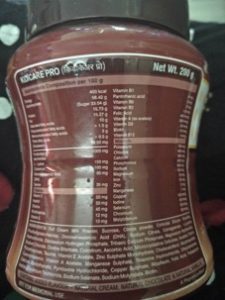
The ingredients has it marked well – 58g carbohydrate of which 33g is composed of sugar. The composition in which sugar is used – as sucrose, fruit oligosaccharides, microcrystalline cellulose. This one caught my eye – colloidal silicon dioxide – this is an anti-caking agent, which when added to powders lets them flow freely, without ending up in a cake like mass. It is said that this compound is biologically inert, has been marked safe by FDA. The other one was – microcrystalline cellulose – a very refined term for refined wood pulp! It is used in vitamin supplements or tablets as an anti-caking agent. Microcrystalline cellulose is said to be a chemically inert compound which is not degraded upon digestion nor does it have any appreciable absorption. When consumed in large quantities, it may act as a laxative.
7. Junior Proteinex
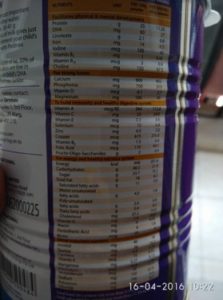
Ok, Proteinex has been in the market for quite a long time. It is said to give good results in terms of individuals looking at healthy weight gain. I haven’t had a look at the regular tin, but was able to get a picture of the tin of Junior proteinex. The ingredients list says for every 100g of the mix 48.5g of carbohydrates, of which 33.7 g is sugar! So is this the reason for weight gain??
8. Enfagrow
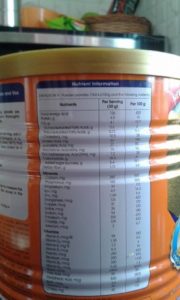
This is another supplement drink that I was introduced to when a friend started working at the firm that manufactures Enfagrow and Enfamil. So upon examining the contents, per 30g of mix I found there is 18.3g of carbohydrate; 5.4g sugar. Sounds less, but for 30g of the drink – 5g of sugar… hmm…
9. Ensure
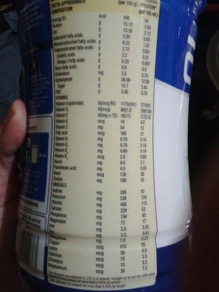
Similarly, in this drink we can see from the ingredients list that there is 56g of carbohydrate and 14.7g of actual sugar; you never know what other form this sugar is present in the drink. Now we know what each drink contains, do you still want to go ahead and offer this to your children, making them susceptible to various diseases as they grow up? I think not. So, what could be suitable alternatives for picky eaters? You could either give them plain milk, health mixes that can be made at home with various nuts and millets or even nut-based milk such as almond milk (only in case your child is not allergic to almonds). There are several other forms of drinks that you can give them, as smoothies which you can make at home. Smoothies can be a mix of different fruits or a single fruit with milk. Fruits are sweet by nature so you will not actually find the need to add extra sugar.
Many parents complain that their children crave sugary foods – now you know why. Unknowingly, from an early age we might be teaching their pallets to prefer the sweet flavour. The best way is to feed children real food which will teach their pallets to recognize good quality and nourish their bodies from a young age!
We want to hear from you!
What are your thoughts about this topic? Have you fed your kids with any of the above products? The purpose of this article is not to be judgmental of anyone’s choices. As mentioned above, these drinks are recommended by doctors, so it can’t be totally parents fault. However, now that you know better, how are you going to change? Let us know, we would love to help you out!
Are you a concerned mom? Is there a product on the market which you find disturbing in terms of ingredients? I invite you to blog about it and share your research with thousands of other moms! Submit your article to dorit@healthbeginswithmom.com.